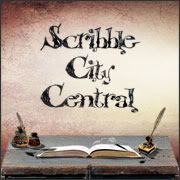...RUN ENTIRELY BY CHILDREN'S AUTHORS!
If you'd like to see what all the excitement is about, please click on
AN AWFULLY BIG BLOG ADVENTURE.
I'll be there on 9th July with a BRAND NEW VIDEO. But that's all I'm saying for now...!
Monday, 20 June 2011
Tuesday, 14 June 2011
A Writer's Right to Die - My Reaction to Terry Pratchett
I've been away for a while. Thinking. Dreaming. Playing with words. But I've chosen to come back today and write about my personal reaction to a difficult and emotive subject which polarises opinion. You'll probably know what I'm talking about. Terry Pratchett's BBC documentary, Choosing to Die was screened on the BBC last night. I cried throughout, though not for the reasons you may imagine. It was a dignified, wonderful and moving programme made with unflinching bravery and infinite compassion. Much will be said on both sides of the fence about the rights and wrongs of assisted suicide. I can only speak for myself here.
Terry Pratchett is above anything else a writer. He has long been one of my favourite authors in the world. He makes me laugh, he makes me cry (more crying), he makes me think how damned clever he is and how I wish I could construct the kind of punes he does without looking like a complete fule. He also happens to have Alzheimer's. He's made 'coping with it' jokes about that--at the beginning wondering "what kind of vegetable would I be?". Now, as the condition progresses, he is confronting his own end--and how he would want that to occur.
"When I can no longer write my books, I am not sure I want to go on living" he says in the programme.
I understand that. I do so understand that. In the last weeks, I have had a scare with my eyes. I have thought hard about not being able to read, to see--to type the words which demand to be let out of my head. It was and is a fearful terror and it made (and makes) me feel sick and scared and lost. So, as a writer, not to be able to rely on one's brain to come up with the goods--to lose the words which make you who you are--must be unimaginably horrifying to contemplate. Terry says that the things which would make him consider ending his own life are:
"Not being able to dictate any more; not being able to be a writer any more; not being able to communicate."
There are many dreadful and horrific things going on in our world right now. Please, don't think I'm ignoring those when I say that one of the greatest pleasures in my life is looking forward to a new Pratchett novel. A world in which that could no longer happen would be less bright for me, but I know that it will occur, probably sooner rather than later. (I feel the same way about the fact that there will now never be another Diana Wynne Jones book, by the way). But that is a very personal and probably selfish reaction. More importantly, what Terry's programme has crystallised for me is that I do now believe more than ever before that anyone with a terminal or incurable condition should have the right to choose the manner of their death and the time of it, if they wish to do so and are mentally capable of making that decision for themselves. Very few can afford £10,000 to go to Dignitas. Those who do go there from this country would much rather die in their own homes with their own things around them, with no fear that their loved ones will be prosecuted.
"Who owns your life?" Terry asks.
Who owns me? I do. And if I ever find myself in Terry's position or that of Andrew Smedley, Rob Colgan or Hugo Claus, I would like to have the choice of when to let my words go quiet. Or not to let them go quiet. That is the nature of the word 'choice'.
You can find out more about Dignity in Dying here.
Terry Pratchett is above anything else a writer. He has long been one of my favourite authors in the world. He makes me laugh, he makes me cry (more crying), he makes me think how damned clever he is and how I wish I could construct the kind of punes he does without looking like a complete fule. He also happens to have Alzheimer's. He's made 'coping with it' jokes about that--at the beginning wondering "what kind of vegetable would I be?". Now, as the condition progresses, he is confronting his own end--and how he would want that to occur.
"When I can no longer write my books, I am not sure I want to go on living" he says in the programme.
I understand that. I do so understand that. In the last weeks, I have had a scare with my eyes. I have thought hard about not being able to read, to see--to type the words which demand to be let out of my head. It was and is a fearful terror and it made (and makes) me feel sick and scared and lost. So, as a writer, not to be able to rely on one's brain to come up with the goods--to lose the words which make you who you are--must be unimaginably horrifying to contemplate. Terry says that the things which would make him consider ending his own life are:
"Not being able to dictate any more; not being able to be a writer any more; not being able to communicate."
There are many dreadful and horrific things going on in our world right now. Please, don't think I'm ignoring those when I say that one of the greatest pleasures in my life is looking forward to a new Pratchett novel. A world in which that could no longer happen would be less bright for me, but I know that it will occur, probably sooner rather than later. (I feel the same way about the fact that there will now never be another Diana Wynne Jones book, by the way). But that is a very personal and probably selfish reaction. More importantly, what Terry's programme has crystallised for me is that I do now believe more than ever before that anyone with a terminal or incurable condition should have the right to choose the manner of their death and the time of it, if they wish to do so and are mentally capable of making that decision for themselves. Very few can afford £10,000 to go to Dignitas. Those who do go there from this country would much rather die in their own homes with their own things around them, with no fear that their loved ones will be prosecuted.
"Who owns your life?" Terry asks.
Who owns me? I do. And if I ever find myself in Terry's position or that of Andrew Smedley, Rob Colgan or Hugo Claus, I would like to have the choice of when to let my words go quiet. Or not to let them go quiet. That is the nature of the word 'choice'.
You can find out more about Dignity in Dying here.
Labels:
Choosing to Die,
Dignity in Dying,
Lucy Coats,
Terry Pratchett
Subscribe to:
Comments (Atom)















